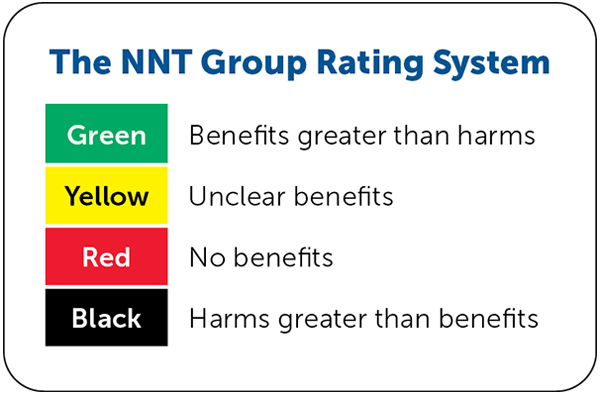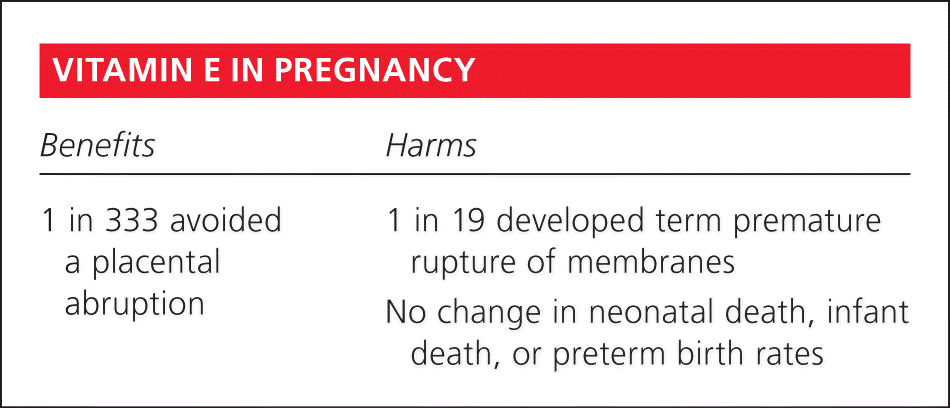
Am Fam Physician. 2017;95(7):online
Author disclosure: No relevant financial affiliations.


| Benefits | Harms |
|---|---|
| 1 in 333 avoided a placental abruption | 1 in 19 developed term premature rupture of membranes |
| No change in neonatal death, infant death, or preterm birth rates |
Details for This Review
Study Population: Pregnant women
Efficacy End Points: Placental abruption avoided
Harm End Points: Stillbirth, neonatal death, perinatal infant death, preterm birth, preeclampsia, intrauterine growth restriction, premature rupture of membranes (PROM), placental abruption
Narrative: Vitamin E has antioxidant properties that decrease oxidative stress within the body. During pregnancy, increased oxidative stress has been linked to pre-eclampsia, intrauterine growth restriction, and PROM. This review evaluates the effectiveness of vitamin E supplementation in pregnancy.1
Approximately 22,000 women from 17 trials were included in the analysis. The review reports no clear difference in stillbirth or neonatal death. There was also no difference noted for perinatal death, preterm birth, preeclampsia, or intrauterine growth restriction, although the authors note substantial heterogeneity for these specific outcomes.
PROM and placental abruption were considered secondary outcomes. Heterogeneity is a limiting factor for analysis of preterm PROM; however, the authors reported no difference using advanced data analysis. There is a statistically significant increase in the risk of term PROM in patients taking vitamin E supplements vs. the control groups (number needed to harm = 19; P < .001). Patients who received vitamin E had a decreased risk of placental abruption (number needed to treat = 333; P = .02).
Among the most patient-important outcomes, such as infant death, vitamin E does not show any benefit. Although there may be some benefit in decreasing placental abruption, vitamin E may cause harm during pregnancy by increasing term PROM.
Caveats: Perhaps the most notable limitation, beyond the marked heterogeneity, is the administration of vitamin E with other supplements. All of the studies included in the review gave patients vitamin E with other supplements, usually vitamin C. This complicates the data because of the inability to separate the effects of vitamin E from the effects of the other supplements.
Vitamin E supplementation is a controversial topic in newborns, increasing the importance of these data. Oxidative stress in newborns is implicated in intraventricular hemorrhage, retinopathy, and lung disorders. Vitamin E supplementation in newborns for prevention of these complications has been associated with an increase in neonatal sepsis and necrotizing enterocolitis.2 This review does not support the use of maternal vitamin E supplementation because of complications with the pregnancy but does not look at the rate of newborn outcomes such as intraventricular hemorrhage. Death rates in the newborn were analyzed, but no statistically significant difference was noted.
Based on available data, further studies focused on vitamin E supplementation alone are not warranted and may not be safe for the pregnant patient.
